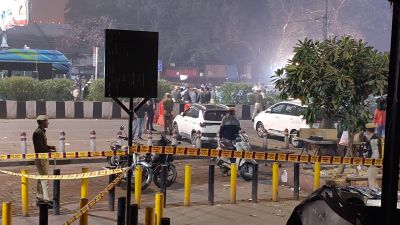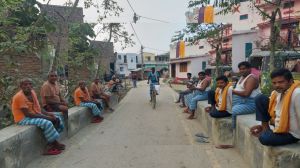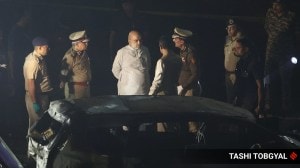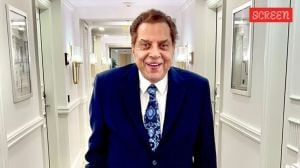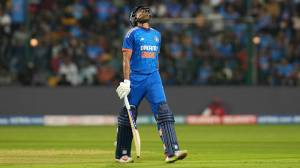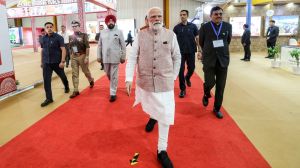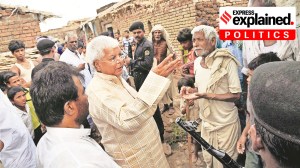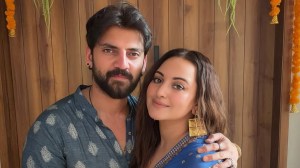The US wants those caught (for Mumbai attacks) be given adequate sentences,Hafiz Saeed is prosecuted,LeT infrastructure dismantled
<I>US Ambassador to India <B><font color"#cc000">Timothy J Roemer</font></B> feels that now that theres plenty of evidence pertaining to the 26/11 Mumbai attack,Pakistan needs to put it together and prosecute the guilty. Defining the US-India relationship,he says the US wants to expand the relationship beyond national security to new areas. In this interview with The Indian Express Editor-in-Chief Shekhar Gupta on NDTV 24x7s Walk the Talk,the ambassador says that while it is important to go after the terrorists,it equally important to strike the ground on economic and energy issues and reach out to farmers and the poor </I>
Hello and welcome to walk the talk. I am Shekhar Gupta at New Delhi s Roosevelt House and my guest this week,the new US Ambassador to India-Ambassador Roemer. Welcome to walk the talk.
TR: Thank you. Namaste
SG: Namaste. The new US Ambassador. Do you feel new or do you feel a veteran already?
TR: I feel probably this is the most important post in the world. Certainly there are always challenges and opportunities here. I am learning as we go. I was instructed by President Obama to try to go out and meet as many people as I possibly can. I remember standing in the White House with the President. The president looked at me and said,Tim,you know that there are a billion people in India ? I said yes sir,I know that. he said,I want you to meet as many of those billion people as you possibly can.
SG: Infact when you back to him,you qualify to him by saying that you forgot to tell me that there are a billion Indians in India ,who are argumentative,difficult,diverse.
TR: Well sir,we are diverse. And I think it is one of the great strengths and one of the commonalities between Indian and the United states . We know in the United States we have great diversity in income,in class,in religion,in people. And if there was a scale of 1 to 1o in the United States ,we like to think we are about nine and a half. I think in India there might be a new scale up to 19 in the diversity. And it is a great strength of vitality and vibrancy that is here that is great
SG: We saw you at a school yesterday. We have also seen the US embassy now organizing Iftars in different parts of the country. This people to people contact is not something we associated American diplomacy with. So is there a shift and is this an Obama left shift?
TR: Well,it is two things,I think. One,president Obama has said to me directly at the White House,I want you to go out and meet people. Make sure that it is not just important government officials in Delhi but it is people throughout the country,rich and poor,in school and out of school,people with opportunities and people without opportunities. I think also I get it from my parents. My parents,I love them dearly,they are great role models,and my father and mother always said to me that it is one thing to have faith and to go to your services and pray,it is another thing to act that out and community service is a way to act that out,helping to plant trees here in a Delhi park,going to a particular school and helping mentor education. Many Indian businesses do the same with corporate social responsibility,reaching back to help others,after they have succeeded,bring more along the path to success. And I think you gonna see a lot of it,well I mean this mission in Delhi .
SG: That is also a six-time congressman speaking because you learn to look after your constituents.
TR: That is important. That is experience. Well,you look after your constituents but you also know in jobs like this that communicating with people is important,not only communicating with important business leaders,encouraging trade hopeful for a successful Doha round,advocating closer defence and military cooperation,success in the civilian nuclear deal. These are all important but so are people to people ties. After all that is the basis,that is the strength of our two countries foundation. Business to business,people to people
SG: Would you say the India relationship is one of the few or one of the more visible areas where Obama administration has simply picked up the thread from the previous one? That there is total continuity?
TR: I think there is continuity and change and both are strengths in this relationship. I think the continuity is very respectful,a strong tie between United States and India ,its people to people,it is business to business,it is 95,000 Indians in American colleges and universities. But it is also the success of the political system. Democrats and Republicans,President Clinton and President Bush,my predecessor David Mulford,it is also Indian government officials,Prime minister Singh,Prime Minister Vajpayee,we all recognize that this important relationship is a historic destiny to bring us together,not only in a bilateral way but in a global way to work on some of our worlds most important problems. And I think that is where the President (Obama ) wants to take this relationship.
SG: So declassify for us,only what you want to declassify,of the conversations you had with your predecessor David Mulford. Did he give you any dos and donts? Did he hand you over some unfinished business or pass on some bucks to you?
TR: David is a very gracious guy and I reached out to different ambassadors who have served in this position when President Obama picked me and I want to learn from them to see what to do,as you said,and what mistakes not to make. David was very very nice and said,I wanna take you to and Sally out for dinner with my wife Jenny. They did. He told me some very important things about completing the nuke deal,there are some legacy issues we need to work out there between our two governments,we are making progress but there are still some things to push forward. He told me how to run a big mission,some dos and donts there for morale and for constituencies that you play to and he also told me about the State department and the White House and how to work with both. So,David,Richard,Frank Wisener,all the way back to John Kenneth Galbraith and Patrick Moynehan . There are some big shoes to fill in this job.
SG: There are two very distinct categories. You have Frank Wisener,Pickering ,these were people who were career foreign service officers. But there have been appointees like you,Mulford before that Dixalase came from outside
TR: John Kenneth Galbraith. He came from outside,from President Kennedy.
SG: Absolutely. Is there a difference in approach,by virtue of the fact that you come in from sort of the political system. Do you see yourself being able to get more done in Washington or do you see usual bureaucracy in the way.
TR: I think that is a great question. Certainly,I have a great deal of respect for the foreign service and our State department and people there who have spent their lives and careers and who have come in with a great deal of knowledge about how to run a mission. I also think there are inherent and huge advantages to somebody coming from the political system and somebody who is close to the president. I am the presidents representative here in India . The president and I campaigned together in a host of states very early on. I had long discussions with the president at the White House about US-India relations where he has talked to me about his conversations with Manmohan Singh,who he has such high respect for. But I also think that one of the advantages of coming from the political system is and my background in Congress is politics,and knowing how the state department and the white house operate. When we need to get some budget done here,a political problem of the finance is solved,where do we go in the Washington DC to get that done. We also have a very vibrant Indian caucus back in the United States and I have worked with them before
SG: can you tell me one thing that President Obama said about Prime Minister Manmohan Singh?
TR: When we had completed our meeting after about an hour after talking about US-India relations,he came very close to me and said,I just want you to know one thing about Prime Minister Manmohan Singh. He touched his heart and he said,every time I talk to him,I feel very close to him. We have this connection and you make sure that when you see him that he is in good health and that I look forward to talking to him. Then he said,every time I speak to him on the phone or see him at a meeting in London ,I think it will be 5-7 minute conversation and it doubles because we have this connection. We know there is so much work our two countries can accomplish together. He feels very close to him.
SG: I ask you because there is this feeling in India –there was about a six-week period of some kind of a chill,you know President Bush had his highest ratings of any country in India until the day he demitted officethere was a feeling that somehow emphasis on India would shift. Your predecessor was in Walk the Talk just a few months before he left
TR: I saw the interview.
SG: You saw the interview. And infact,he counted as the main achievement of his period the de-hyphenation of US policy towards India and Pakistan . There was a great fear that it will get re-hyphenated. Ricahrd Holbrooke came,so there were many insecurities. Were you exposed to nay of those before you came in and after you came in?
TR: No,infact,I think what President Obama and Secretary Clinton have advocated is how do we build on this foundation of a very successful and significant civilian nuclear relationship that has broken through some new faith and trust and expand this into four-five key global issues facing us today. You know,President Obama doesnt do anything in small ways. He is a big thinker. He wants a broad ambitious agenda. So,one issue on civilian nuclear has now been expanded to strategic and defence cooperation,to after threats like Lashkar-e-Toiba but also global issues of defence cooperation with our two great countries. He is talking about climate,energy,green initiatives,green jobs,he is talking about womens development and education reform and he is also talking about Doha round and trade and economic links between the two countries,how do we help the poor come into the middle class.
SG: Since President has this big picture,big strokes of the brush,the vision kind of a person,he is a visionary. What is his big vision on India and India -Us relations?
TR: His big vision is,we think that India is an emerging global player significant in a host of different issues from how do we cooperate on strategic cooperation in very important neighbourhood,how do we work together on this. Mr Chidambaram just had a very successful visit as Home Minister to the United States . We are now doing unprecedented exchanges on intelligence sharing,we are gonna do maga city police training,the FBI,which did so much good work after the Mumbai attacks,I think we gonna see enhanced cooperation and training from them. That,we build on that. How do we now start to cooperate on climate issues and clean technologies? Both our countries are interested in developing new markets here.
SG: I think Mr Chidambaram has to pick you brain on many things because you were a member of the 9/11 commission. You looked at what goes wrong with intelligence and you have a better insight than many people here. Have you had a conversation yet?
TR: I have met several times with Mr Chidambaram and we have had very good conversations as I had with Mr Narayanan. I had a very good conversation with the Prime Minister in a sit-down that lasted about an hour,about a week and a half ago. I think one of the reasons President Obama picked me,selected me for this job is the closeness to him,of course,my experience in national security issues and the 9/11 commission and especially given the Mumbai attacks just happened here. How do we work together,we did somethings wrong prior to 9/11,how do we fix those. We have about 39 different proposals that we have come along in United States . What can we help India with? What can we learn from India in this process? How is India approaching this? And how do we combine our forces going forward to take on this emerging world and regional threat.
SG: Because you were also one of the prime movers of the Homeland Security Bill and then you opposed it.
TR: I did. One of the best votes I ever cast.
SG: So what happened because I am sure Mr Chidambaram would like to know something more about that as well because that is a debate that goes on all the time in federal coalition structure like India.
TR: Well,I initially was a co-sponsor of the bill that would put together a entrepreneurial and quick acting and small Homeland Security Department just like the enemy we often face whether it is Al-Qaeda,the Taliban,the Laskar-e-Toiba,different groups and cells and they are quick acting. They can strike at a moments notice anywhere in the world. We dont need b bureaucracies to deal with that. we need quick acting agencies. So
SG: And you think what you had moved had become a big bureaucracy?
TR: I think there are still some challenges that we face on that front. I think Janet Napolitano is working them through and putting together a very smooth operation
SG: That is a lesson fro India to learn as well because a new idea could become a big bureaucracy in no time.
TR: I think what you wanna do is you wanna put together an agency,something that thinks ahead of the organisations that you are hoping to strategise against. You want the vision coming before the attacks. You want be protective and proactive. And you wanna break down Stove pipes in different organisations,you wanna share knowledge from the top of the organisation down to the states,your system is very similar to our system and the local polices and special operations can do a lot to achieve safety in our communities.
SG: So,obviously you wont tell me exactly what you and we are doing together but tell me a little bit about how we are doing it. Is there a mechanism now in intelligence sharing,how do we share it,how do we jointly asses threats. Just how deeply we are involved with each other now?
TR: Well,I cant get into all the details
SG: Nor do I want to know.
TR: ….but what I can tell you is that on intelligence sharing side that we are in unprecedented ways sharing more and more actionable intelligence,things that you can act on immediately. We are finding ways to communicate knowledge ahead of time and share threats.
SG: Could we have shared somethings since 26/11 which may have already prevented something?
TR: Very likely. That has happened. We are not only working on intelligence sharing we are working on our people coming from the United States to India and sharing their knowledge,sharing past mistakes that we have made but also learning from India. People from India are going to America ,learning from our police operations,our forensics,our DNA training,our technology
SG: And there is technology transfer of some kind?
TR: There are technology transfers that are taking place and will take place in the future that will benefit both countries and there are bigger things that we can do together moving forward. Look India has a rich tradition on the non-proliferation area. Mahatma Gandhi,whose birthday we celebrated,talked about a world free of nuclear weapons. Rajiv Gandhi had a plan to achieve this. On nuclear non-proliferation there are opportunities for our two countries to work together
SG: But that is universal global disarmament.
TR: That is disarmament but there are also ways that we can that we can work on non-proliferation together,there are ways that we can work on climate change through solar energy and alternative energy projects together. Both our countries are concerned about cleaner air,cleaner water,protecting the soil for our farmers being more productive and growing crops,flooding issues that may take place in your country and our country and how do we mitigate those floods ahead of time. After all,you know,many of our defence exercises now in the United States are not just about other nation states threats,they are about transnational threats,flooding issues,flu,cyber-security. How does the United States of America and the Republic of India work on these transnational issues.
SG: Are we talking adequately?
TR: I think we are but there is also room for us to even get better on these issues.
SG: I am fascinated that you mentioned Lashkar-e-Toiba in the same vein as Al-Qaeda and others,the Taliban. So that sets at rest a suspicion that even Americans would nuance it ,terrorism to Pakistans west and terrorism to Pakistans east. But are you really optimistic that Pakistanis will do something real on Lashkar-e-Toiba,given the linkages there. The latest New York Times story is a good example that linkages continue.
TR: The United States has been very clear about this. We experienced our 9/11 and I served on that commission,met with many of the families who lost sons and daughters. When I came here with secretary Clinton we stayed in the Taj Mahal hotel in Mumbai. I met the General Manager who lost his entire family,which is absolutely unfathomable to me,unthinkable to me that you could lose an entire family. We have both experienced that. The United States lost six people in the Mumbai attacks,India lost dozens and dozens of people. United States has been very clear about this. One,we want those six people that have been caught and are now on trial starting in early October in Islamabad are given adequate lengthy sentences. Two,Hafiz Saeed is prosecuted and brought to justice and three,that the infrastructure of Lashkar-e-Toiba is dismantled. They are regional threat not just a threat to India . So those are very clear issues for the United states .
SG: So,you dont make the distinction between Lashkar-e-Toiba being more indigenous,unless India settles Kashmir,people in Pakistan s Punjab will be angry,what can we do?
TR: Look,there are many issues that United States needs to engage India with. One is national security,one is economic security,one is energy security. There are many things that we can address. One of the things that President Obama has done so brilliantly in his last few months in office,he is only in there close to ten months,is that he has said that you need to use all of the resources of the United States,its power,defence,military but also its diplomacy and its development and we need to do all those things at the same time. We can fight Lashkar-e-Toiba and Al-Qaeda but we also we also have to have economic issues and energy issues and development issues and caring for the poor,that we are doing at the same time because our greatest military people have told us that this is not just a military war,this is a battle of ideas. This involves development,this involves bringing forward the poor,giving opportunities. When you read Osama bin Ladens messages,he has no jobs programme,he has no healthcare programme,he has no education reform programme,it is all about killing people. We step in,the United States and India ,and talk about what we do to help the poor,how do we give opportunities to people.
SG: Nor does Hafiz Saeed?
TR: None of them do. It is all about destruction,killing people and taking people away from their families
SG: He talks about unfurling Pakistan s flag on the Red Fort?
TR: No positive ideas,no development issues,nothing constructive and then he goes and kills people using the people they recruit to blow themselves up.
SG: You say he goes and kills. When we say that the Pakistanis always tell us but where is the evidence against Hafiz Saeed. Would you put some sanity in that discussion?
TR: Well I certainly think,reading through some of the dossiers that Indian government has exchanged with Pakistan ,that there is a lot of proof there,United Nations has Hafiz Saeed on their resolution 1267 and the Interpol has put Hafiz Saeed on the red-flag notice. There is plenty of evidence there,they need to put it together and prosecute.
SG: And what is your hope or expectation. You think this will happen?
TR: well,I am hopeful but I also know as the ambassador to India ,not Pakistan ,that I have a big agenda from President Obama to work on economic issues,how can we bring our two countries together
SG: And you cant have Hafiz Saeed highjack it?
TR: Well,I think if that is all you do,if all you do is the military side then you are not doing as much as they are because Al-Qaeda has a political strategy and economic strategy and a military strategy. The United States and India need to continue to battle on all fronts.
SG: I will tell you,I am pushing the envelope on this one,I tell you the skepticism in Indian public opinion comes from the fact that when Americans are killed in 9/11,FBI can come and get Ramzey Yousuf. In this case,Americans also got killed but FBI has not even been allowed to go and interrogate anybody. So are you getting caught in this? Are the Pakistanis saying,look,you want help on our western frontier,let us deal with this?
TR: Well,again,I am not gonna get into all kinds of Pakistan issues. If Ambassador Paterson was here,she should answer a question like that. I so much look forward to the opportunities to engage with the people of India on so many new areas and fronts. Build on the civilian nuclear deal,talk about how we grow a middle class in India as partners,how in Indias great tradition of caring for the poor,reaching out on the issues of disarmament,on global peacekeeping missions,how do these two great democracies and two great powers put their forces together on those fronts,how do we create new markets for green collar jobs and energy. These are exciting areas that President Obama wants to move forward with and we hope that when Prime Minister Singh visits United States as our first official state visitor,these are the kind of issues that we would talk about.
SG: And you would rather that no Hafiz Saeed,no 26/11 replay derails this process. Isnt it?
TR: We can do both. We can pursue justice for these people and we can also pursue economic
SG: No,I am saying one more attack
TR: Certainly United States and India are working so closely and in unprecedented ways that you and I talked about today to try to prevent any kind of attack here. It is in United States interest,it is certainly in India s interest that attack. But also there are so many other issues
SG: And your counterpart and people in Washington are saying that just as seriously to the Pakistanis as well?
TR: I think our government is treating this issue with utmost seriousness at all levels. I have had conversations with Richard Halbrooke on this issue,I have conversations with the highest people in our government at the State department and the White house and they all so much value this relationship with India that they know in pursuing this on all fronts,it is important for us that we go after the terrorists,it is important for us that to strike the ground on economic and energy issues,it is important for us to complete the civilian nuclear deal and it is important for us to find out how to reach out and help farmers and how to reach out to the poor.
SG: And find new areas to talk about,that we havent talked about. Because our dialogue have become a bi unidimensional over the past few years. So you are trying to rectify that?
TR: We wanna take this from a unidimensional approach and success in one area to success in other areas,not only on a bilateral front but on a global front. Think about the rich potential as we move forward with a great democracy in America and a great democracy here in India,the diversity of the peoples,the rule of law,the markets created by clean energy products,the concerns in technology and science exchanges,how do we create new educational opportunities for both peoples. This is truly exciting between our two countries.
SG: Ambassador,we have come this far in this conversation without mentioning one word,China . The analyst community has also been trying to analyse the new India-US relationship in terms of USs relationship with China or US s view of China in this region. Is that going to be the new hyphenation? An India-China policy.
TR: Here is my take on that. It is certainly an important relationship for the United States and we just had some important strategic and economic dialogue with China that I think was very helpful and productive. As the President has said,he thinks the India relationship is not only one of the most important but also one of the best. And there are so many commonalities that we have just discussed between our two countries.
SG: So,you are not hyphenating India and China now?
TR: We are not hyphenating. It is United States and India . The President has said that,the secretary of state has said that .
SG: Because one hyphen has no shifted from India-Pakistan to Af-Pak. Right?
TR: I dont think there is any kind of hyphenation right now between Pakistan and India and China and India .
SG: I said Af-Pak,although that is sometimes written without a hyphen even,they are joined together?
TR: Well,I think all those are miscalculations.
SG: Media creations.
TR: Media creations.
SG: You have learned quickly in Delhi .
TR: If I were one thing in Delhi its lets talk about US-India relationship but ask the next twenty questions about Pakistan . When we have the opportunity to move this relationship as we are forward on many fronts.
SG: If you have looked at our headlines lately,in most papers,not so much as ours,you would now think that after the 20 questions on Pakistan the next 20 questions will be on China .
TR: Well I know your paper has been covering that very consistently lately.
SG: But I must say very conservatively. We have been trying to sort of pour oil over troubled waters–nothing so exciting has happening. But have you lost some sleep over this.
TR: I have not. No. I have read Mr Narayanans comments in your paper and other papers and he has said that things are going quite well and there is some media hype to this and he is working the issue very hard and I think the Prime Minister has said similar things.
SG: There is some hype on China in your political systems. Speaker (Nancy) Pelosi called them awful thingshell on earth.
TR: Again I am the Ambassador to India so I am not gonna talk about what the Speaker says or what the vice-president says or what the former officials have said about that relationship.
SG: But China is a source of some argument in American politics,and concern.
TR: Well,no relationship is perfect. And I am sure the United States and India relationship will have our disagreements too. But also a strong relationship,a relationship where you trust one another,where confidence is,you can either work through those relationships and find grounds of commonality and concern and work out that problem or you move to another issue. I dont agree with my wife sally on every issue,I dont agree with my parents on every issue. No relationship in the world is gonna be .
SG: I bet she disagrees with you on more issues than you disagree with her on?
TR: One thing we dont disagree on is our love for basketball.
SG: Absolutely. And I hope we can get to teach you some cricket.
TR: I would love to. I am very interested in that. I was greatly disappointed that India didnt make it into the semi-finals.
SG: But you also saw one billion Indians praying for the Pakistanis.
TR: And that is progress in diplomacy in the world.
SG: If you only left it to cricket.
TR: And the Pakistanis gave it a great effort to try to get India
SG: Oh,I mean as a confidence building measure,nothing could be better. Let me tell you one more thing,going back to politics,you have got a great advantage because your arrival has coincided with the arrival of a new government. So you get stability and consistency,to use a cricketing expression,you can now be set for a long innings because you got four years at that end and you got five years at this end.
TR: We have had an election in India ,the people have spoken and reelected the previous government. They elected in the United States through democracy and the ballot box a brand new person for change and bigger ideas and agendas. Both of these people get along so well and they want to talk about big ideas and expand this relationship beyond national security to brand new areas. We are very excited about this.
SG: What you have got to do is export a bunch of basketball coaches to us?
TR: Well,we are gonna do that.
SG: Your president is a very good player. Isnt he?
TR: He is a good player. I gotta tell you a story. Here is the basketball that when I was campaigning with President Obama in Indiana ,he was a senator at that time,I said to him I know you didnt do a good job doing bowling in Pennsylvania . Infact,it didnt go well there at all. But if you can shoot hoops in Indiana ,where we really care about it like you care about cricket in India ,we will go a long way to winning this state. If you can shoot some hoops in this gymnasium (that we were in with a basketball hoop just like that),we got very all kinds of very important people,MVPs,VIPs in here,and they will talk you up all around in Indiana . I had my son Mathew with me that day. Mathew hit the president,then senator,with a bounce pass. He took this ball and from about here,he let it fly and it went straight to the hoop,swish as we call it in basketball. Didnt touch the rim,right through,clean perfect shot and all the people in the room started clapping. And for the next three weeks on all the news channels,the first thing they talked about to me was not Pakistan ,it wasnt the economy or jobs,it was hat guy can play ball. He can really play ball.
SG: How good are you at it?
TR: I can shoot. He (Obama) beat me that day but I can shoot. I will give it a go for ya. Can I take my coat off and give it a go. I will shoot what we call a lay-up and then I will give you some longer shots too.
SG: Sure.
TR: That is a lay-up (after putting the ball through the hoop)
SG: I think you can join the basketball team.
TR: Now how about you?
SG: Well,if you had a cricket pitch,I might have spun one odd past your bat but not basket ball. Thank you
TR: Thank you very much.
Transcript prepared by Mehraj D Lone



- 01
- 02
- 03
- 04
- 05


